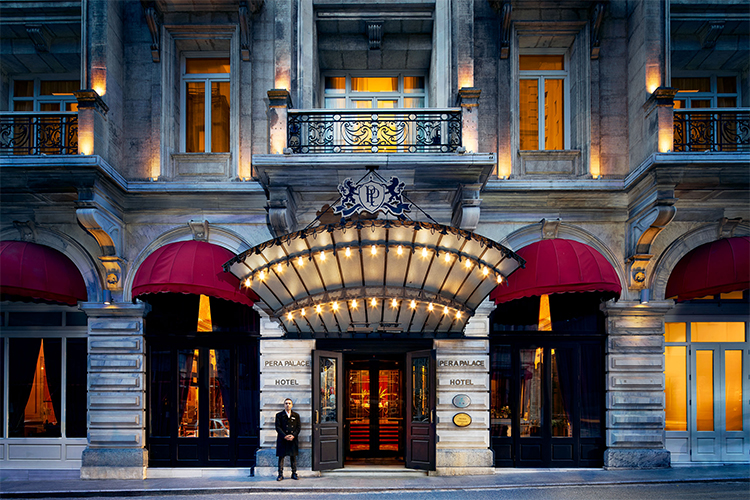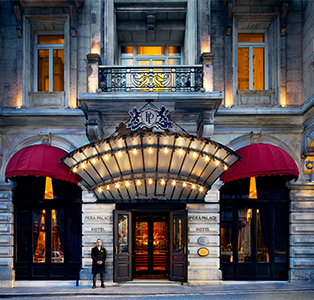Painter Şeker Ahmet Pasha and His First Exhibition in Pera
Pera Palace hosted many artistic events as well as the first exhibition of Şeker Ahmet Pasha. Turkey’s first European standards with appropriate activities carried Pera Palace hotel, which has always managed to be talked about himself.
In order to look at the foundation story of Pera Palace, we first need to go on a small journey. The bourgeois class who want to travel from the capitals of Europe to Istanbul, is “east”, put forward the idea of Orient Express. However, they want to make this trip in luxury with a fastidious look. Although the routes of the bourgeois class have changed considerably since 1883, it basically extends from England in the northwest to Istanbul in the southeast. The constantly moving streets of the seven-hill city, the sounds of prayer rising from the minarets, the covered bazaar with the smell of spices and fabric textures in mind; this is the exotic point of the trip.
Therefore, people from Europe needed a hotel to accommodate their standards. Georges Nagelmackers, an entrepreneur from Istanbul, realized this need and rolled up his sleeves for construction. With the entire existence of his own company and the large amount of credit he received from the bank, this business cost him a bit dear. Pera Palace was established at the Istanbul stop of this travel as a western hotel for the European elite.
Pera Palace Hotel lived its golden years before the First World War. With the proclamation of the Republic, it hosted balls. At the same time in Istanbul; and therefore this hotel has been realized in many first experienced in Turkey. For example, with the establishment of the hotel, the first painting exhibition in Istanbul was held. Works of Şeker Ahmet Pasha were exhibited in this exhibition in 1895. The first New Year’s ball was held in this hotel on the night connecting 1925 to 1926.
Life Story of Şeker Ahmet Pasha
The father of Şeker Ahmet Pasha, who was born in Üsküdar in 1841, is Ali Efendi. The painter, whose real name is Ahmet Ali, was protected by his brother-in-law Yahya Pasha when he was a child. He started Üsküdar Primary School in 1846 when he was 5 years old. Şeker Ahmet Pasha, who attended the Medical School for a short time, which he entered with an examination when he was 14 years old, realizes that being a doctor is not for him and leaves the school and in 1856 he enters the Military School.
Şeker Ahmet Pasha works hard to improve himself in this field due to his interest in painting. These efforts enable him to be appointed to the art teaching department of the Military Academy at the age of 18. He graduated from the Military Academy with the highest degree. Abdulaziz, a sultan who is fond of art, after seeing the work of lieutenant Şeker Ahmet Pasha, sent him to the Mekteb-i Osmani in Paris in 1861-1862 to study painting. Mekteb-i Osmani is a school opened for young people sent to Paris for education to be brought to a level where they can follow the lessons and kept under discipline. This school, where the majority of the teaching staff is French, was established in 1860 and closed in 1878 after the Franco-Prussian war. While Ahmet Ali attends the School of Fine Arts, he also attends the workshops of Leon Gerome and Louis Boulanger at the School of Fine Arts. During his stay in Paris, Neo-Classicism and Romanticism movements continued their influence, while there were also realistic painters such as Courbet and Millet. The Barbizon school painters Daubigny, Diaz, Camille Corot, Theodore Rousseau wandered into the woods and outdoors, taking notes and sketching, and painting romantic landscapes that glorified nature. Despite the academic education, Şeker Ahmet Pasha felt closer to the Barbizon School painters. He graduated in 1869 by exhibiting some oil painting works and a charcoal portrait of Abdulaziz in Paris painting halls. He is sent to Italy for three months by the school principal for his successful education in Paris.
Return to Istanbul
In 1871, he returned to Istanbul with other Turkish artists in Paris. He was appointed to the School of Medicine with the rank of captain, and at the same time became a palace aide. Apart from these duties, he continued his art works. He established friendships with young painters. He shared his information about the picture with them and supports them. During these years, he was appointed as an art teacher to Beyazıt-Zeyrek Kaptan-ı İbrahim Pasha School. As a result of his achievements, he became major in 1876, lieutenant colonel in 1877, colonel in 1880, brigadier general in 1885, lieutenant general in 1890 and he was given the title of painter of the temple. In 1896, he also assumed the duty of Foreign Guests Envoy-Protocol Officer, dealing with the hospitality business of foreign guests.



